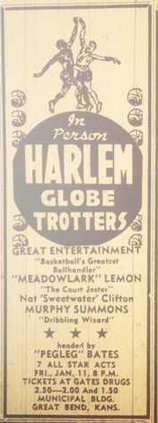The Great Bend Tribune ran a half-page advertisement in January, 1963 for newspaper delivery boys: “Buying at wholesale , selling at retail, and figuring his own profits -- the newspaper boy puts into practice everyday what he is learning at school. That is why many boys become better students after they have a newspaper route. And calling on prospects and signing up new subscribers does much more than teach salesmanship -- it develops poise and a winning personality. No wonder so many present-day employers--when they have job openings with big possibilities--say, ‘Find me a young man who has had newspaper route experience.”
It’s been 10 years since the Tribune became a morning paper, and the after school jobs once held by preteens became early morning jobs held by adults. This was in response to a trend among daily papers to become the first source of the day’s news for readers, rather than one of the last. According to publisher Mary Hoisington, it took advantage of a news lag that occurs from 11 p.m. to 6 p.m. If something important happened during the day, it would be there bright and early the next morning by 6:00 a.m.
Also in 2003, the Tribune also stopped publishing a Monday paper and briefly experimented with publishing a Saturday paper instead of a Sunday paper. That, in the words of long-time Tribune employee Karma Byers, “went over like a lead balloon.” Saturday was dropped and Sunday brought back.
Postal increase
The cost of sending a letter went from four to five cents, and the Great Bend post office sold out of one cent stamps the first day of the rate change by 3:30 p.m. That day set a record for the largest single-day sale of stamps of all denominations of all time, and required the postmaster to double the number of counter staffers to handle the crowd. The next day, a new shipment of 7,000 stamps was sold out by mid-morning, with another shipment of 7,000 expected the next day. Since March 3, 1863 when the first official postage stamps were sold, the price only fluctuated between two and three cents. It would go up during a time of war, and then fall again during peacetime. Between 1919 and 1932, it remained at two cents. Postcards cost a penny to send. There it stayed until 1958, when it went up from three to four cents. Since then, the cost has been on a steady incline, changing by one to four cents every one to four years. On Jan. 27 of 2013, the price will go up again from 45 cents to 46 cents. Postcard stamps too will go from 32 to 33 cents.
Moment of silence
Church-State Division May Be Hot 1963 Item, an Associated Press story which ran in the Jan. 14, 1963 edition of the Tribune, gave an overview of how different cases in the nation for or against the inclusion of prayer in school were progressing following the Supreme Court’s ruling the previous year banning the recitation of official prayers in public schools. The fuss was over what the definition of official was in this instance. Today, in Kansas, and in Great Bend, the statute concerning prayer in school reads: “Teachers may observe a brief period of silence at the start of each day. This period shall not be conducted as a religious exercise, but shall be an opportunity for silent prayer or “silent reflections on the anticipated activities of the day.”
Basketball magic
The Harlem Globetrotters visited Great Bend on Jan 11, 1963 at the city auditorium. This was the original team that included Meadowlark Lemon, Nat “Sweetwater” Clifton, Murphy Summons and “Pegleg” Bates. Tickets for the event were a mere $1.50 to $2.50 a piece. This was just before Fred “Curly” Neal began performing. He became a Globe Trotters icon, performing with the group for 22 years. They got their start in the 1920s, and continue to perform today, though with a new group of players. In 1971 they began a 24 year winning streak. In 1974, they were named “America’s Ambassadors of Goodwill” by President Gerald Ford. If anyone out there remembers attending that game, drop us a line or give us a call. We’d love to hear about it.
Unsolved mystery
Hoisington police investigated a gruesome prank which took place at a senior class evening party at Hoisington high school, Friday, Jan. 11, 1963. Faculty members and some students were in charge of refreshments doing the cooking in the home economics room.
“Mrs. John Jason Meyer, a faculty member, opened an oven door and was shocked to find a dog’s head had been placed on the oven rack. The head of the dog had been severed from its body, and a hangman’s noose around the neck indicated the dog may have been strangled before it was decapitated.”
It was unknown if it had been left at the school at the time of a break-in two nights earlier, the article reported. The incident was not discussed further in the Tribune, so we checked in on the archives of the Hoisington Dispatch. There was no mention at all of the incident. That’s leaves some unanswered questions. Was the culprit ever caught? Was a motive ever discovered? Readers in the know, we’d love to hear from you.
Paperboys, 5 cent stamps, prayers and more in 1963





